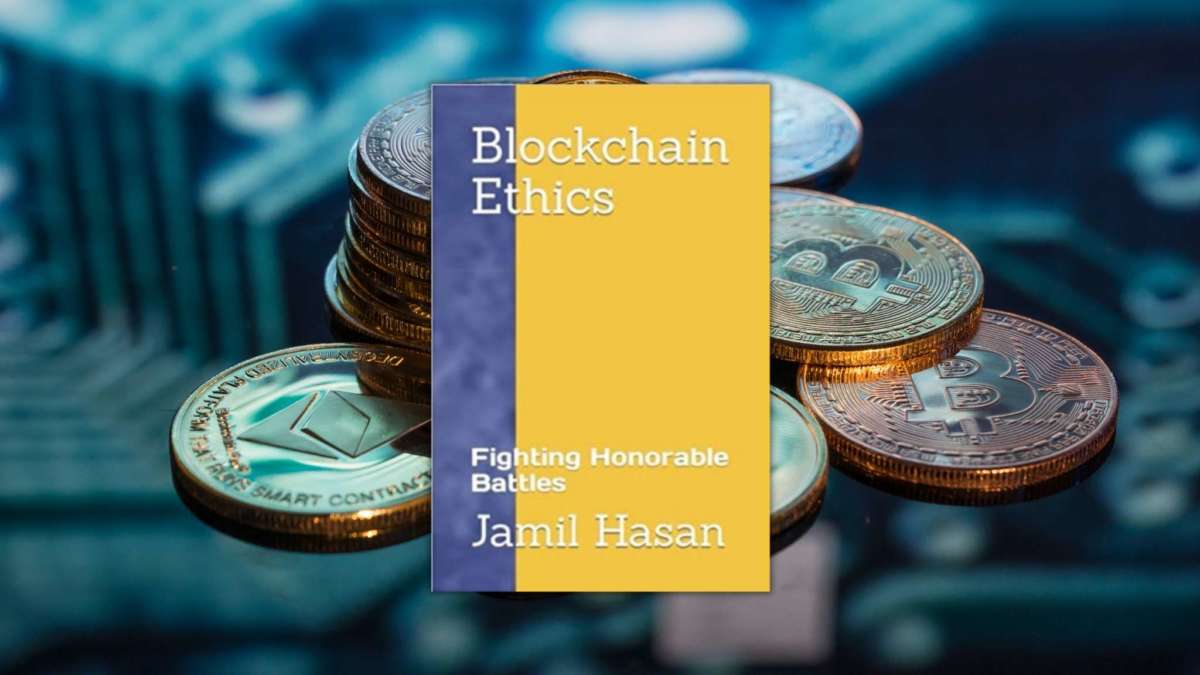Blockchain Ethics: Fighting Honorable Battles
Some crypto-pundits compare the cryptocurrency phenomenon to the Internet — a specialized technology that became universal. Cryptocurrency hasn’t yet become part of most daily lives, but according to that same New York Times column, “20 percent of American adults, and 36 percent of millennials, own cryptocurrency.”
Blockchain Ethics: Fighting Honorable Battles by Jamil Hasan continues his Blockchain Ethics consumer guide series. This latest entry was written in response to what he saw as media dis/misinformation about the real benefits of cryptocurrencies and blockchain technology. For every proponent of crypto, you can find a naysayer about its future.
This book may challenge readers with little foreknowledge of cryptocurrency and other financial systems; for that, you might want to read Hasan’s Blockchain Ethics: A Bridge to Abundance first. However, even newbies will come away with a better understanding after reading Blockchain Ethics: Fighting Honorable Battles. Hasan is a good communicator, and while some concepts he explores may be complex, his writing style is not.
NEWBIES WILL BETTER UNDERSTAND CRYPTO
Cryptocurrency became a thing with the launch of bitcoin in response to the 2008 financial crisis. Today, there are thousands of different digital asset currencies, but they all employ a blockchain, a transparent permanent record of buy and sell transactions.
Hasan experienced the 2008 financial crisis as an AIG digital analyst, with a role in helping to repay the company’s $180 billion bailout. He contrasts bitcoin with the “mortgage casseroles” that left investors and insurance companies in the dark about who owned what, and at what risk, when the mortgage companies failed. Blockchain-based transactions would have documented the money trail, he writes, “which would have led all the way to the doors of the speculators who created the bubble, and ended up benefitting from it.”
Hasan bases his new book on numerous interviews from his Crypto Corner podcast at Irish Tech News “with the best and brightest leaders, ethicists and amazingly optimistic people on the planet, talking with me about the future of cryptocurrencies,” and its role in the infrastructure of tomorrow’s finance, investment, culture, governance and community systems.
THE BOOK IS BASED ON MULTIPLE INTERVIEWS
The interviews are excerpted with links to the full conversations so that you can go as deep as you wish into the subject matter. To name only a few, his guests include:
- David Schwartz, project director for the Litecoin Foundation, which offers a Litecoin Visa card
- Michael Casey, chief content officer at CoinDesk, the leading media platform for the blockchain and digital asset community
- David Palmer, the Vodafone Business lead for blockchain technology
- Alex Adelman, CEO and co-founder of Lolli, a rewards application that lets people earn bitcoin when they shop
- Michael Creadon, president of Inveniam DeFi Devs (DeFi is short for decentralized finance)
Cryptocurrencies and their blockchain technology could improve systems in many ways, says Hasan:
- Transfer data and payment without the fees of middlemen
- Provide banking services for unbanked/marginalized populations
- Enable transparency with data capture and sharing
- Create new financial products
- Give people living under corrupt governments access to other economic systems
- Level the global playing field
“Every industry is being disrupted on a global scale,” says Hasan, and he believes the blockchain space will continue to evolve and flourish in response. Based on Hasan’s assessment, the message is clear: like Mark Twain’s premature obituary, reports of bitcoin’s demise have been exaggerated.
Purchase Blockchain Ethics here.
RELATED POSTS
“Re-Generation X” Is a Path to Restore Gen Xers’ Financial Stability
Old Solutions to New Problems: “Cyberjutsu,” the Ninja Approach to Cybersecurity
Homeland Security Expert Teaches How to Stop Crime and Be “The Smartest Person in the Room”
Buy this Book!
Amazon




